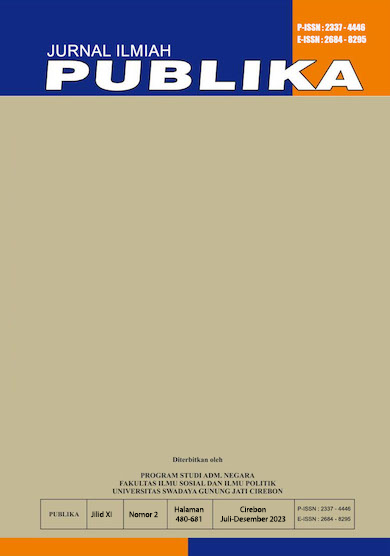IMPLEMENTASI KEBIJAKAN SUSTAINABLE DEVELOPMENT GOALS DALAM PENUNTASAN KEMISKINAN DI DESA SUNGAI KUNYIT HULU KABUPATEN MAMPAWAH
DOI:
https://doi.org/10.33603/publika.v11i2.8853Abstract
References
Abdul Wahab, Solichin. 2005. Analisis Kebijakan: dari Formulasi ke
Implementasi Kebijakan Negara. Jakarta: Bumi Aksara
G Subarsono. 2005. Analisis Kebijakan Publik Konsep, Teori dan Aplikasi.
Yogyakarta: Pustaka Pelajar.
Halim A. Iskandar. 2020. SDGs DESA percepatan pencapain tujuan pembangunan nasional berkelanjutan, Yayasan pustaka obor Indonesia Anggota IKAPI. DKI jakarta.
https://kemendesa.go.id/berita/view/detil/3423/kemendes-pdtt-prioritaskan-penggunaan-dana-desa- 2021-dorong-capaian-sdgs.
Islamy, M. Irfan. 2000. Prinsip-prinsip Perumusan Kebijakan Negara. Jakarta. Sinar Grafika
International European Environment Agency, 2020, Paethership for common implementation of invironment sustainable development gals//UNEP/GRID-Center,poland.
International NGO Forum on Development. (2015). Outcome Document Transforming Our World: The 2030 Agenda of Sustainable Development.
Ishartono &Santoso Tri Raharjo, Sustainable Development Goals (SDGs) dan Pengentasan Kemiskinan, Social Work Journal, Volume 6, Nomor 2. ISSN 2528-1577(e)
Laporan UNDP Indonesia. (2015). Konvergensi Agenda Pembangunan.
Nawa Cita, RPJMN, and SDGs. Jakarta: UNDP Indonesia
Susiana, S. (Ed.). (2015). Pembangunan berkelanjutan: dimensi sosial, ekonomi, dan lingkungan. P3DI Setjen DPR.
Sugiyono. 2012. Metode Penelitian Kuantitatif, Kualitatif. Dan R&D. Bandung. Alfabeta.
Setyawan Dody. 2017. Pengantar Kebijakan Publik. Malang. Delegasi Media.
Moleong, Lexy, J. 2014. Metodelogi Penelitian Kualitatif. Bandung. Remaja Rosdakarya.
Sugiono, 2016. Metode Penelitian Kuantitatif, Kualitatif. Dan R&D. Cetakan Ke 17. Bandung. Alfabeta.
Surya, Dharma,(2008). Pendekatan, Jenis dan Metode Penelitian. Direktorat Pendidikan. Jakarta
Triastuti, D.A. (2018). Pengaruh Lingkungan Kerja, Kompetensi dan Iklim Organisasi Terhadap Kinerja Pegawai. Program Studi Manajemen Pascasarjana Universitas Galuh Ciamis. Journal of Management Review, 2(2), 203-208. ISSN-P: 2580-4138issn-E2579-812x. DOI: http://dx.doi.org/10.25157/jmr.v2i2.1796
Wisnumurti, A. A. G. O., Darma, I. K., & Suasih, N. N. R. (2018). Government Policy of Indonesia to Managing Demographic Bonus and Creating Indonesia Gold in 2045. Journal Of Humanities And Social Science (IOSR-JHSS), 23(1), 23-34.
Widhiastana, D.N., Wardana, M., & Sudibya, I.G.A. (2017). Pengaruh Lingkungan Kerja dan Penghargaan Terhadap Kreativitas dan Kinerja Pegawai di Universitas Pendidikan Ganesha. E-Jurnal Ekonomi dan Bisnis Universitas Udayana 6.1 (2017): 223-250 223 ISSN : 2337-3067
Downloads
Published
Issue
Section
Citation Check
License
The Authors submitting a manuscript do so on the understanding that if accepted for publication, copyright of the article shall be assigned to Jurnal Ilmiah Publika Prodi Administrasi Publik. Universitas Swadaya Gunung Jati as publisher of the journal. Copyright encompasses rights to reproduce and deliver the article in all form and media, including reprints, photographs, microfilms, and any other similar reproductions, as well as translations.
Jurnal Ilmiah Publika, Universitas Swadaya Gunung Jati and the Editors make every effort to ensure that no wrong or misleading data, opinions or statements be published in the journal. In any way, the contents of the articles and advertisements published in Jurnal Ilmiah Publika are the sole responsibility of their respective authors and advertisers.










